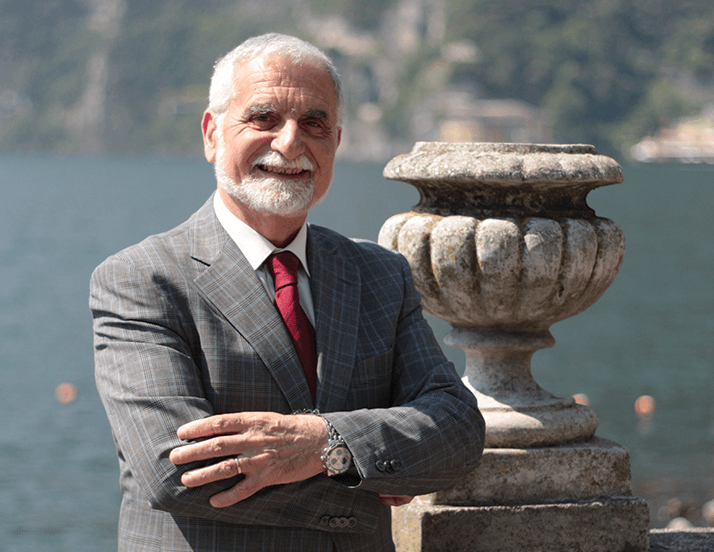
How did you get into capillary chromatography?
Actually, I was a high school chemistry teacher for 13 years before I joined the CNR in 1983. In those early days, I was using paper electrophoresis for chiral separations. I then moved briefly onto capillary isotachophoresis before constructing a very simple capillary electrophoresis (CE) instrument in 1988. I was one of the first to publish separations of chiral drugs using CE – something that is still very memorable for me.
Could you tell us about your research now?
My group focuses on fundamental research in separation science, which includes method development but also the study of new stationary phases, such as core-shell particles, for chiral separations. Equally important is the application of new methodologies to practical problems in areas such as food, environmental or forensics analysis.
At five persons, my group is not very large, but we are totally engaged in optimizing techniques, such as capillary electrochromatography (CEC) and nano-LC. Some say CEC is dead, but I do not believe so. It combines the best features of both HPLC – high selectivity – and electrophoresis – high efficiency. We’ve applied CEC to chiral separations in a number of currently hot areas. By separating L and D forms of amino acids in fruit juice, for example, we can flag suspect samples that may have been subject to adulteration. And in forensic analysis, the enantiomeric ratio of illicit drugs can provide important clues as to the origin of the compound.
For capillary and nano-LC, we’ve assembled our own systems and routinely pack our own columns with diverse particle types (for example, HILIC, phenyl-hexyl, and silica derivatized with glycopeptide antibiotics).
Miniaturized techniques tend to be greener than other approaches. Is that important to you ?
I think we should all more deeply consider our ecological impact. In that regard, the miniaturized techniques we focus on do only use a few microliters of mobile phase and nanoliters of sample; the knock-on effect is reduced waste, which is good for the environment – and reduced costs.
What are your plans for the years ahead?
I have a few years to think, but I will probably continue my research even after retirement. I have a great group and they seem to like working with me. But then again, I am based in the wonderful city of Rome and love walking. I’ve noticed that whenever I wander the streets, I seem to find something new; it would be nice to have more time to rediscover my city – especially having enjoyed the film “La Grande Bellezza” [The Great Beauty] so much, which was, of course, based in Rome. You know, if you walk into a church in Rome, you may be greeted by the paintings of famous artists like Caravaggio for free. Why? Because this art is for the people!
And should science be similarly for the people?
That’s a tricky question! It’s true that researchers often work with funding from the state and have certain obligations, but I have to say that we, as researchers, must satisfy our own needs and desires first – after all, we often sacrifice time with friends and family to find success – and that can only happen when we are truly happy in what we do. Hopefully, any success ultimately benefits mankind.
Congratulations on receiving the Giorgio Nota Award at Riva 2014!
Thank you. It was a very big surprise. I only learned about the award a few days beforehand. Giorgio Nota was a professor at the University of Naples and was the first to publish on applications of capillary chromatography. The Award recognizes an outstanding contribution to capillary chromatography, so I feel very proud.
Did you ever meet Nota?
Yes, in the 1980s. He had an interest in thin layer chromatography but I had different interests and missed the opportunity to collaborate. I remember him well and know that he was a brilliant scientist and excellent teacher.
You thanked many people in your acceptance lecture…
Yes, it was a long list from all over the world – and included many of the PhDs, post PhDs, and collaborators I have had the pleasure to work with over the years. Many of them are good friends that have gone onto great things – but not always in chemistry. One ex-PhD is head of security at Vienna airport and, whenever I pass through, I always visit him – even after over 20 years. After all, human exchange is one of the most important aspects of science. We should all be able to smell the humanity in what we are trying to construct together.
I lost my wife last year and that’s still very fresh in my mind. I dedicated the award to her because she was the one who pushed me to move from teaching and into the position at CNR; she knew that research was what I really wanted to do. I have to say, I’ve never once looked back. In Italy, we say, “behind every great man is a great woman” – I didn’t say that in my speech, because I didn’t want to appear boastful – but I did want to stress that I owe any success to her. And if she was still alive today, I am sure she would have been here in Riva to share it with me.
